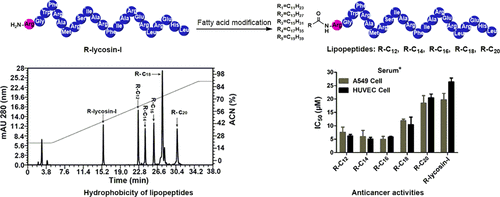当前位置:
X-MOL 学术
›
Mol. Pharmaceutics
›
论文详情
Our official English website, www.x-mol.net, welcomes your
feedback! (Note: you will need to create a separate account there.)
The Roles of Fatty-Acid Modification in the Activity of the Anticancer Peptide R-Lycosin-I.
Molecular Pharmaceutics ( IF 4.5 ) Pub Date : 2018-09-17 , DOI: 10.1021/acs.molpharmaceut.8b00605 Cui Jian , Peng Zhang , Jing Ma , Shandong Jian , Qianqian Zhang , Bobo Liu , Songping Liang , Meiyan Liu , Youlin Zeng , Zhonghua Liu
Molecular Pharmaceutics ( IF 4.5 ) Pub Date : 2018-09-17 , DOI: 10.1021/acs.molpharmaceut.8b00605 Cui Jian , Peng Zhang , Jing Ma , Shandong Jian , Qianqian Zhang , Bobo Liu , Songping Liang , Meiyan Liu , Youlin Zeng , Zhonghua Liu

|
We previously reported that R-lycosin-I, modified by amino acid substitution from lycosin-I, was a peptide with anticancer activity and a linear amphipathic α-helix conformation and that it can induce cancer cell apoptosis and inhibit cell proliferation. However, the anticancer activity of R-lycosin-I was not highly improved. In order to further improve the anticancer activity of R-lycosin-I, fatty acids with different chain lengths from 12 to 20 carbons were introduced to the N-terminal of R-lycosin-I to yield five lipopeptides (R-C12, R-C14, R-C16, R-C18, R-C20). The physicochemical properties of the five lipopeptides were determined by hydrodynamic size, ζ-potential, and circular dichroism spectroscopy, respectively. Then, the cytotoxic activity of these lipopeptides in A549 cells was evaluated with serum-containing and serum-free media, respectively, showing their anticancer activities were all increased through fatty-acid modification. This may be a result of the increased hydrophobicity and the enhanced interaction with the cancer cell membrane. The cytotoxic activity of R-C16 was 3-4-fold higher than that of the original R-lycosin-I and also was the strongest among all five lipopeptides, whether in serum or serum-free conditions. Compared with R-lycosin-I, the lactate dehydrogenase (LDH) leakage assay and scanning electron microscopy (SEM) indicated that R-C16 had a weakly destructive effect on the cancer cell membrane, but it might cause apoptosis to exert an anticancer activity. Finally, the impacts of fatty-acid length on the physicochemical properties and the anticancer potential of peptide were discussed. Our data consolidate work on fatty-acid-modified anticancer peptides.
中文翻译:

脂肪酸修饰在抗癌肽R-Lycosin-I活性中的作用。
我们以前曾报道说,R-lycosin-I(通过从lycosin-I进行氨基酸取代而修饰)是一种具有抗癌活性和线性两亲性α-螺旋构象的肽,它可以诱导癌细胞凋亡并抑制细胞增殖。但是,R-lycosin-I的抗癌活性没有得到很大提高。为了进一步改善R-lycosin-I的抗癌活性,将具有12至20个碳原子的不同链长的脂肪酸引入R-lycosin-I的N端,以产生5个脂肽(R-C12,R- C14,R-C16,R-C18,R-C20)。五个脂肽的理化性质分别由流体动力学大小,ζ电位和圆二色性光谱确定。然后,用含血清和无血清的培养基评估这些脂肽在A549细胞中的细胞毒活性,分别表明它们的抗癌活性均通过脂肪酸修饰而增强。这可能是疏水性增加和与癌细胞膜相互作用增强的结果。无论在血清还是在无血清条件下,R-C16的细胞毒性活性都比原始R-lycosin-I高3-4倍,并且在所有五个脂肽中最强。与R-lycosin-I相比,乳酸脱氢酶(LDH)泄漏测定和扫描电子显微镜(SEM)表明,R-C16对癌细胞膜的破坏力较弱,但可能引起凋亡,从而发挥抗癌活性。最后,讨论了脂肪酸长度对肽的理化性质和抗癌潜力的影响。
更新日期:2018-09-05
中文翻译:

脂肪酸修饰在抗癌肽R-Lycosin-I活性中的作用。
我们以前曾报道说,R-lycosin-I(通过从lycosin-I进行氨基酸取代而修饰)是一种具有抗癌活性和线性两亲性α-螺旋构象的肽,它可以诱导癌细胞凋亡并抑制细胞增殖。但是,R-lycosin-I的抗癌活性没有得到很大提高。为了进一步改善R-lycosin-I的抗癌活性,将具有12至20个碳原子的不同链长的脂肪酸引入R-lycosin-I的N端,以产生5个脂肽(R-C12,R- C14,R-C16,R-C18,R-C20)。五个脂肽的理化性质分别由流体动力学大小,ζ电位和圆二色性光谱确定。然后,用含血清和无血清的培养基评估这些脂肽在A549细胞中的细胞毒活性,分别表明它们的抗癌活性均通过脂肪酸修饰而增强。这可能是疏水性增加和与癌细胞膜相互作用增强的结果。无论在血清还是在无血清条件下,R-C16的细胞毒性活性都比原始R-lycosin-I高3-4倍,并且在所有五个脂肽中最强。与R-lycosin-I相比,乳酸脱氢酶(LDH)泄漏测定和扫描电子显微镜(SEM)表明,R-C16对癌细胞膜的破坏力较弱,但可能引起凋亡,从而发挥抗癌活性。最后,讨论了脂肪酸长度对肽的理化性质和抗癌潜力的影响。











































 京公网安备 11010802027423号
京公网安备 11010802027423号